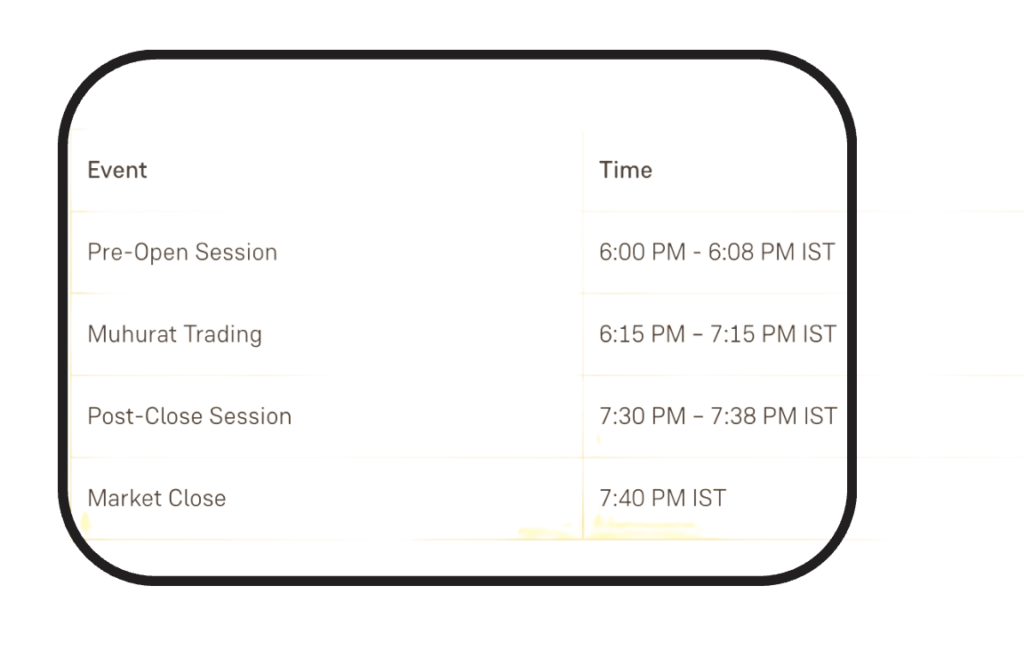Muhurat trading, a unique and symbolic practice in the Indian stock market, refers to the auspicious one-hour trading session on Diwali, the Hindu festival of lights. This tradition, rooted in the Indian culture, is more than just a trading session; it’s a blend of spirituality, tradition, and finance.
The Significance of Muhurat Trading
Let us take a look at the importance of Muhurat Trading.
1. Cultural and Religious Importance:
- Roots in Hindu Astrology: Muhurat trading is based on the belief in ‘Muhurat’ or an auspicious time. Hindu astrology suggests that activities begun during this time are more likely to succeed.
- Diwali and Wealth: Diwali, marking the return of Lord Rama in Ramayana, is also associated with Goddess Lakshmi, the deity of wealth and prosperity. Trading during this time is believed to bring blessings and prosperity throughout the year.
2. Historical Perspective:
- Long-Standing Tradition: This practice has been observed for decades, symbolizing the age-old relationship between spirituality and trade in India.
- Evolution Over Time: While it began with traditional trading communities in Bombay Stock Exchange, it now encompasses a wider range of investors, including retail and institutional participants.
3. Market Implications:
- Sentimental Boost: Muhurat trading often brings a positive sentiment, with many investors participating out of tradition, thereby increasing market liquidity.
- Indicator of Trends: Some investors analyze the Muhurat trading session to gauge the market mood and potential trends for the upcoming year, though its predictive accuracy is debated.
How Muhurat Trading Works
1. Timing and Duration:

- Specific Hour: The timing, usually in the evening, aligns with the auspicious period of Diwali. It lasts for about one hour.
- Pre-Market Activities: Before the trading session, there are ceremonial activities, including a Lakshmi Puja.
2. Trading Activities:
- Equities and Derivatives: All segments of the market including equities, derivatives, and commodities are active during this hour.
- Limited but Meaningful Trades: The volume may be limited compared to regular trading days, but these trades carry a symbolic and sentimental value.
3. The Ritualistic Aspect:
- Opening Bell: The session is inaugurated with the ringing of the opening bell, often by dignitaries or celebrities.
- Token Purchases: Many investors make token purchases of stocks, often held for the long term, as a sign of good luck and prosperity.
The Importance for Investors
1. Symbolic Start:
- Beginning of the Samvat Year: Muhurat trading marks the beginning of the new Hindu Samvat year, a traditional calendar followed by the trading community.
- Renewed Investment Goals: Investors often use this occasion to rethink and renew their investment strategies.
2. Community and Celebration:
- Unity Among Traders: This tradition brings together the trading community, fostering a sense of unity and shared cultural heritage.
- Festive Spirit in Markets: The usually serious trading floors are lit up and decorated, reflecting the festive spirit.
3. Psychological Impact:
- Optimism and Hope: The auspicious timing is believed to instill a sense of optimism and hope among investors for the year ahead.
- Ritualistic Investments: For many, these investments are more about participating in a tradition than financial gain.
Conclusion
Muhurat trading is more than just an annual event; it’s a blend of culture, tradition, and finance, symbolizing the harmonious coexistence of ancient beliefs and modern economic practices. For investors, it’s a time of reverence, hope, and community, making it a cherished and integral part of India’s financial calendar.
Wondering what to do during Muhurat Trading? Head on to Gap Up.







